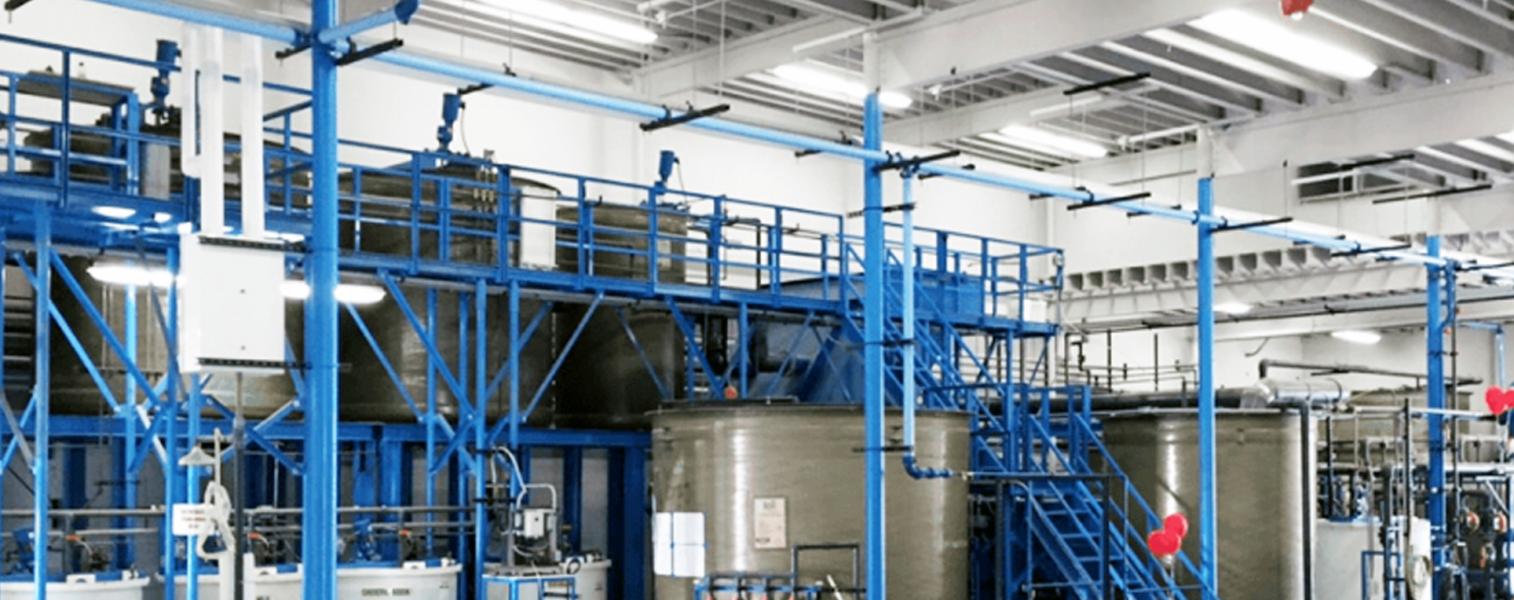Wastewater Treatment for Surface Finishing Applications
Surface finishing and metalworking techniques allow manufacturers to create complex metal goods that are immediately ready for use in consumer, commercial, and industrial applications. However, these processes generate hazardous waste that can contaminate wastewater and must be removed before discharge
Wastewater Treatment for Surface Finishing Applications
Wastewater treatment for surface finishing and metalworking removes various oils, suspended solids, and heavy metals before discharge. With growing demands for metal finishing in industrial manufacturing, wastewater treatment is crucial in protecting the environment and remaining compliant with stringent discharge standards. Learn more about the benefits of wastewater treatment and why it's necessary after various surface finishing treatments.
The Benefits of Wastewater Treatment
There are many benefits of wastewater treatment for surface finishing applications. These include:
- Provides clean and reusable water. Discharging contaminated wastewater is harmful to the environment. Industrial wastewater treatment ensures that the water is clean enough for discharge or reuse in your operations. Reusing wastewater for additional metalworking and finishing applications is a great way to boost sustainability efforts and earn benefits.
- Preserves the environment. Wastewater from the surface finishing process contains various oils, heavy metals, and solid materials that are harmful to the environment. Wastewater treatment removes these contaminants to help in reducing environmental pollution.
- Prevents disease. If wastewater is not treated properly, it can be the source of many diseases and bacteria that can harm people, animals, plants, and trees.
- Supports the economy. Treating wastewater can significantly reduce the amount of money spent on environmental cleanup projects. Wastewater treatment also creates jobs, as industrial wastewater plants require a lot of manpower to operate.
- Source of energy. Wastewater treatment facilities can generate their own electricity through the treatment process, thereby reducing energy demand for their operations.
Wastewater Treatment for Surface Finishing Applications
There are multiple surface finishing methods that pose unique risks to the water used during the process. These methods include:
Anodizing
Anodizing metal involves treating metal pieces in a sulfuric acid bath. While this imparts a helpful protective coating on the metal products, it creates aluminum hydroxide and sulfuric acid byproducts. Aluminum hydroxide can't be released into the municipal wastewater system, and the EPA enforces disposal of this wastewater strictly. However, the water can be rinsed with RO/DI water purification systems or with continuous flow treatments for larger operations.
Coil Coating
Coil coating processes transform long strips of metal material into a painted coil via chemical cleaning, coating, and painting processes. Each stage of chemical treatment uses water, and the wastewater left over at the end of the process cannot be dumped into the municipal system because it potentially includes hazardous traces of chromium, lead, nickel, cyanide, and other contaminants. The water needs to be treated in compliance with the EPA's Coil Coating Effluent Guidelines and Standards.
Die Casting
Die casting processes shape metal material into distinct forms. While these processes are largely mechanical, they generate wastewater through cooling processes, lubricants, and cleaning stages. The wastewater needs to be heated and distilled to remove trace contaminants that would be harmful to the municipal wastewater system. By proactively treating the water, die casting facilities can reduce waste disposal costs and even reuse the distillate to further reduce waste.
Electroless Plating
Electroless plating is a chemical reduction process that offers uniform coating thicknesses on metal surfaces. This process relies on large amounts of water to facilitate the necessary chemical reactions as well as the initial cleaning step. This water is contaminated with solvents, cleaning agents, and other chemicals. Wastewater treatment processes can isolate or neutralize those chemicals to ensure clean water before discharge.
Electropolishing
Electropolishing processes have multiple wet stages as the polished parts move from tank to tank. This contaminates the process water with lubricants, dirt and oils, metal preparation chemicals, and more. Evaporative rinsing and evaporative water treatment processes can isolate those contaminants so the water and the contaminants can be disposed of properly.
Electroplating
Electroplating processes generate wastewater that includes effluents, hazardous electrolytes, harsh pickling liquids, and metal compounds. Galvanic wastewater treatment processes can reduce the amount of dangerous heavy metals in the water so they don't exceed maximum concentrations.
Passivation
Passivation processes use acidic chemical baths to treat the surface of metal components. This leaves the water with traces of metal contaminants and chemical agents. Rinsing the components and neutralizing the wastewater with alkaline chemicals can make the water safe to introduce to the wastewater system.
Stainless Steel Pickling
Pickling processes use chemicals to remove high-temperature scale and other imperfections from manufactured metal goods. The nitric or hydrofluoric acids often used are extremely hazardous, but they can be diluted to make the water safe for processing and disposal.
Wastewater Treatment From MacDermid Envio
Surface finishing and metalworking processes are water-intensive operations and require appropriate wastewater treatments to avoid pollution and ensure compliance with strict discharge standards. At MacDermid Envio, we strive to create efficient and cost-effective solutions for removing wastes associated with various surface finishing methods. Contact us today to learn more about our wastewater treatment capabilities.
Written by a MacDermid Envio Solutions Subject Matter Expert
